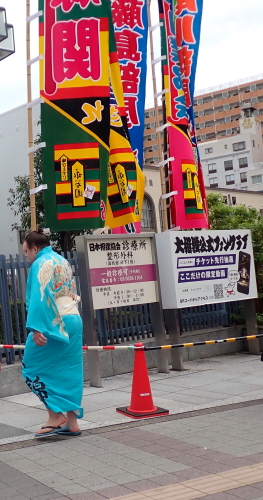源氏物語の和歌の英訳
まず、『源氏物語』に出てきた最初の歌を見てみよう。病が重くなって里下がりして死を待つしかない桐壺更衣が桐壺帝に詠んだ悲しき別れの歌である。
「限りとてわかるる道のかなしきにいかまほしきは命なりけり」
口語訳:今は、それが定めとお別れしなければならない死出の道が悲しく思われますにつけて、私の行きたいのは生きる道のほうでございます。(『新編日本古典文学全集源氏物語1』23頁)
サイデンステッカー氏の訳:
I leave you, to go the road we all must go.
The road I would choose, if only I could, is the other.
「かなしきに」という重要な言葉が訳されていないのと、「いかまほしきは命なりけり」は、直訳でよかったと思うが、英語では、隠喩的な表現に直されている。
筆者の改訳:
I know there is an end to our life,
But still I feel so sorrowful
to be parted from you.
How I wish, if only I could,
to be with you, longer and longer.
改訳では、「How I wish」という感嘆の表現を使って、桐壺の生への強い執着と願望を表現することにした。
次に、桐壺帝が、亡き桐壷更衣の母のところに預けられた幼い光源氏を心配して、命婦を亡き桐壷更衣の母を訪ねさせるが、そのときに命婦に託して、桐壷更衣の母に寄せた歌を見てみよう。
宮城野の露吹き結ぶ風の音に小萩がもとを思ひこそやれ
口語訳:宮中を吹き渡る風の音に涙が催されるにつけても、小萩―若宮がどうしていることかと思いやられます。(『新編日本古典文学全集源氏物語1』29頁)
サイデンステッカー氏の訳:
At the sound of the wind, bringing dews to Miyagi Plain,
I think of the tender hagi* upon the moor.
「宮城野」は桐壺帝自身がいる都を指し、「小萩」は幼い光源氏を指す。サイデンステッカー氏の訳は、直訳に止まっているが、筆者はあえて、直訳の後に転訳をつけた。ちょうど英語の修辞法の一つでもあるparallelismになっていて、詩を損なうことはないと考えている。
筆者の改訳:
Each time I imagine that the wind
is bringing dews to Miyagi Plain,
I think of the tender clovers upon the moor.
Each time I hear the sound of the wind here at the palace,
I shed tears for I can’t help worrying about the little boy.
次に、勅使の命婦が亡き桐壷更衣の母に見送られ、都へ帰るときに詠んだ歌を見てみよう。
3 鈴虫の声の限りを尽くしても長き夜あかずふる涙かな
口語訳:あの鈴虫のように声の限り泣きつくしても、秋の夜長も足りないくらいに、とめどなくこぼれる涙ですこと。(『新編日本古典文学全集源氏物語1』32頁)
サイデンステッカー氏の訳:
The autumn night is too short to contain my tears
Though songs of bell cricket weary, fall into silence.
「ふる」は、「鈴」の縁語「振る」と(「涙」が)「降る」を掛けた言葉である。
筆者の改訳:
The autumn night seems to be
still too short for the bell crickets,
even if they can’t sing any longer.
The autumn night is too short for me
to contain my endless tears.
次に都へ帰る命婦を見送るときに、亡き桐壷更衣の母が詠んだ歌を見てみよう。
いとゞしく虫の音しげき浅茅生に露おき添ふる雲のうへ人
口語訳:虫がしきりに鳴いているこの草深いわ侘び住いにおいでくださって、いよいよ悲しみの涙の露を置き添える大宮人でございますこと。(『新編日本古典文学全集源氏物語1』32頁)
Sad are the insect songs among the reeds.
More sadly yet falls the dew from above the clouds.
「露おき添ふる雲のうへ人」は、帝のそばから訪ねて来た命婦を指している。英訳では、その隠喩は訳出されていない。
筆者の改訳:
Around this humble house,
the songs of the bell crickets
always make me so sad.
Your visit, like the dews falling upon
the roof from above the clouds,
brings me even more sadness.
次に、亡き桐壷更衣の母君が命婦に託して桐壺帝に当てた手紙に書いた歌を見てみよう。母親が亡くなった幼い光源氏を案じる気持ちが表現されている。
荒き風ふせぎし陰の枯しより小萩がうへぞ静心なき
口語訳:荒い風を防いでいた親木が枯れてしまったように、若宮を守っていた更衣が亡くなってからは、残された小萩のような若宮の身の上が案ぜられてなりません。(『新編日本古典文学全集源氏物語1』33~34頁)
サイデンステッカー氏の訳:
The tree that gave them shelter has withered and died.
One fears for the plight of the hagi shoots beneath.
「荒き風ふせぎし陰」は光源氏の母君桐壺更衣を指し、「小萩」は幼い光源氏を指している。サイデンステッカーさんの英訳では、いずれとも訳出されていない。また、「静心なき」の主格は母君自身であるはずだが、「I」ではなく、「one」と第三人称的な表現になっている。
筆者の改訳:
I can’t help
worrying about the little clovers,
since the tree that gave them shelter has withered and died.
I can’t help wondering what will happen
to the little boy left behind.
改訳では、隠喩をあえて訳出したうえで、「乱りがわしきを」(とり乱したさまを)十分に読者に伝わるように「I can’t help」を繰り返し使うことによって、外祖母のどうにもならない心配の気持ちを表現することにした。
次に、桐壺帝が亡き桐壺更衣を偲び、「長恨歌」にあるように、楊貴妃の魂を見つけ出す道士でもいたらいいのに、という気持ちを詠んだ歌を見てみよう。
6尋ねゆくまぼろしもがなつてにても魂のありかをそこと知るべく
口語訳:亡き更衣の魂を捜しに行く幻術師がいてほしいものよ。そうすれば、人伝にでも、その魂のありかをどこそこと知ることができるだろうに。(『新編日本古典文学全集源氏物語1』35頁)
サイデンステッカー氏の訳:
And will no wizard search her out for me,
That even he may tell me where she is?
「もがな」は「いてほしいものよ」という意味の強い願望を表す終助詞である。サイデンステッカー氏の訳では、全体的に疑問文に直しているが、感嘆文のほうが、帝の桐壷更衣を思う切ない気持ちを伝えることができるのではないかと考える。そのため、次のように改訳を試みた。
筆者の改訳:
How I wish there would be a wizard
who can search her out for me,
or just tell me where she is now!
次に、桐壺帝が遠くに住んでいる亡き桐壺更衣の母を心配して詠んだ歌を見てみよう。
7 雲のうへも涙に暮るる秋の月いかですむらむ浅茅生の宿
口語訳:雲上の宮中でさえ、涙にくもってよく見えない秋の月は、ましてあの荒れた宿では、どうして澄んで見えようぞ。どんなにか悲しみにかきくれて過していることであろう。(『新編日本古典文学全集源氏物語1』36頁)
サイデンステッカー氏の訳:
Tears dim the moon, even here above the clouds.
Dim must it be in that lodging among the reeds.
「雲のうへ」は、都を指す。また、「すむ」は、「澄む」と「住む」を掛けた言葉である。サイデンステッカーさんは、ここで直訳をしている。掛詞は訳出されていない。
筆者の改訳:
The moon is dimmed by the tears
even here in the capital.
How can I stop worrying about the one
who live far away in that humble house
at such an autumn night?
隠喩である「雲のうへ」をはっきりと「capital」に置き換えたうえで、「いかですむらむ」によって表現されている心配の気持ちが十分伝わるように、反問の形「How can I stop worrying」を使うことにした。
次に、元結が済んで、桐壺帝が光源氏の結婚を案じて、元結を結んであげた周りの人たちに詠んだ歌を見てみよう。
8 いときなき初もとゆひに長き世を契る心は結びこめつや
口語訳:幼い君がはじめて結んだ元結には、あなたの娘との末長い縁を硬く約束する気持ちを結びこめたかどうか。(『新編日本古典文学全集源氏物語1』47頁)
サイデンステッカー氏の訳:
The boyish locks are now bound up, a man's.
And do we tie a lasting bond for his future?
この歌では、帝が一番言いたいのは、「長き世を契る心は結びこめつや」であり、「いときなき初もとゆひに」は連用修飾語的な役割を果たしているだけだと考えてよかろう。しかし、サイデンステッカー氏の訳では、「いときなき初もとゆひに」は一つのセンテンスとして訳され、冒頭に置かれている。そのため、焦点をぼやけさせている。
筆者の改訳:
I wonder if we have
tied an everlasting bond for his future
while tying the man’s knot for him.
このように、英訳する時に、一番大事な部分を前に持ってくることによって、焦点をぼやけさせない方法もあろう。
上の帝の歌に対して、葵の上の父上である左大臣が次のように返歌をした。つまり、源氏さえ心が変わらなければ、娘のことは心配ないですよ、と言っているのである。見てみよう。
9 結びつる心も深き元結ひに濃き紫の色しあせずば
口語訳:深い心を結びこめた元結ですから、そのゆかりの色の濃い紫の色が、いつまでも変わらぬように、源氏の君の心の変わることがございませぬならば、どんなにうれしいことでありましょう。(『新編日本古典文学全集源氏物語1』47頁)
サイデンステッカー氏の訳:
Fast the knot which the honest heart has tied.
May lavender, the hue of the troth, be as fast.
筆者の改訳:
I do have tied my heart into his man’s knot,
I do hope the dark purple ribbon won’t fade away.
これは、あくまでわかりやすさを考慮して改訳した。
帚木
女性談義に、左馬頭が出会った嫉妬深い女の話が出てくるが、嫉妬のあまり、左馬頭の指を噛んでしまい、左馬頭が怒って、次のような歌を詠んで、女との関係を断ち切ろうとする様子を見せる。
1 手をおりてあひ見し事をかぞふればこれひとつやは君がうきふし
口語訳:指を折って連れ添ってきた間にあったことを数えてみると、あなたの悪い癖はこれひとつだけなものか。(『新編日本古典文学全集源氏物語1』74頁)
サイデンステッカー氏の訳:
I count them over, the many things between us.
One finger does not, alas, count the sum of your failures.
「これひとつ」は、噛まれた指を指す。しかし、「One finger」と訳されると、読者には「一本の指では数え切れない」というふうに理解されかねないので、原歌のニュアンスと微妙に違ってくる。また、「君がうきふし」は、単なる「your failures」というより、「私がつらい思いをさせられているあなたの欠点」といったところであろう。それをすべて表現しだそうとして、次のように改訳した。
筆者の改訳:
As I look back at the time we shared,
I can see so clear
that this is absolutely not the only thing
that makes me suffer.
上の歌を聞いて、女が泣き出し、次のように返した。
2 うきふしを心ひとつにかぞへきてこや君が手をわかるべきおり
口語訳:つらいところを胸一つにおさめていつもがまんしてきましたが、今度という今度こそあなたとお別れしなければならないでしょう。(『新編日本古典文学全集源氏物語1』74頁)
サイデンステッカー氏の訳:
I have counted them up myself, be assured, my failures.
For one bitten finger must all be bitten away?
ここで一番問題になるのは、「うきふしを心ひとつにかぞへきて」についての理解である。サイデンステッカーさんは、「自分の過ちは自分で数えてきたから、よくわかっている」というふうに理解しているようである。しかし、「新編日本古典文学全集源氏物語1」(74頁)の現代語訳と頭注を見てみれば、「つらいところを胸一つにおさめて」となっており、「贈歌の中の語を、そのままに、その意味を変えて用い、やりかえしたもの」とある。そこで、このように改訳を試みた。
筆者の改訳:
I have so far blamed myself
for all the suffering you gave me.
But I guess it is time for me
to say farewell to you.
次に、左馬頭が語った浮気女についてですが、他の男(殿上人)もその女のところに通っている。下の歌は、その男の人が、女に詠んだ「嫌がらせ」とも取れる歌である。
3 琴の音も月もえならぬ宿ながらつれなき人を引きやとめける
口語訳:琴の音も月も、えもいわれず美しいお宅ですが、薄情なお方を引きとめることができましたか。(『新編日本古典文学全集源氏物語1』79頁)
サイデンステッカー氏の訳:
Uncommonly fine this house, for moon, for koto.
Does it bring to itself indifferent callers as well?
「引きやとめける」は、普通の疑問文ではなく、反問である。男は、あえて反問することによって、女に皮肉を言って、からかっているのである。サイデンステッカー氏は、ここで、一般疑問文の形を採って訳しているが、「からかい」のニュアンスをもっと強く表現するために、以下のように改訳を試みた。
筆者の改訳:
The house appears uncommonly fine
with the moon and your koto’s sound,
but why could not it attract
those cold-hearted men?
上の歌に対して、女は次のように返した。
4 木枯らしに吹きあはすめる笛の音を引きとゞむべきことの葉ぞなき(浮気女)
口語訳:木枯らしの音に合奏するような、おみごとな笛の音を引きとめるだけの琴はございません。憎らしいこと。(『新編日本古典文学全集源氏物語1』79頁)
サイデンステッカー氏の訳:
No match the leaves for the angry winter winds.
Am I to detain the flute that joins those winds?
「木枯らしに吹きあはすめる笛の音」は、男を隠喩している。「ことの葉」は「琴」と「言葉」を掛けている。全体的には、「木枯らしの音に合奏するような笛の音を、引きとめるだけの琴(言葉)はございません」(「新編日本古典文学全集」79頁参照)という意味であるが、サイデンステッカー氏の訳は、この意味からずれている。
筆者の改訳:
Your flute seems to
match the cold winter winds.
How can I find any tune on my koto
to detain it to join me?
皮肉を言った男に対して、憎らしげに返した歌であることを読者に伝えるために、「How can I」を使って表現した。また、原歌には、「my house」に当たる言葉はないが、男の詠んだ歌には「宿」があり、それを受けての返歌であるということから、増訳をしても意味の正確な伝達に支障をきたすことはないと考えた。そして、英語の韻律からも、ここでは、増訳をしたほうが「winds」「house」と脚韻を踏ませることができる。
次に、常夏の女(夕顔)が、なかなか訪ねてこない頭中将に詠んだ歌を見てみよう。
5 山がつの垣ほ荒るともおりおりにあはれはかけよ撫子の露(常夏の女)
口語訳:山がつの家の垣根は荒れていても、何かの折々にはお情けの露をかけてくださいませ、その垣根に咲くなでしこの上に。(『新編日本古典文学全集』82頁)
サイデンステッカー氏の訳:
The fence of the mountain rustic may fall to the ground.
Rest gently. O dew, upon the wild carnation.
「撫子」は、夕顔と頭中将との間に生まれた女の子(のちの玉鬘)を指す。つまり、「この子を憐れみ慈しんであげてください」という意味である。しかし、サイデンステッカー氏の訳では、「Rest gently.O dew, upon the wild carnation.」となっている。やはり、微妙に意味がずれている。「この子の面倒を見ていただきたい」と、「この子に対してはあまり酷い仕打ちをしないように」の違いである。訪ねてこない頭中将に来てほしいという気持ちが、というお願いをしているという夕顔の気持ちが読者には伝わらないのではないかと思われる。
筆者の改訳:
The fence of the rustic house
may fall to the ground.
And I may be abandoned by you.)
I hope the dew
will rest gently upon the little carnation.
And I hope you
will take pity on the little girl.
6 咲きまじる色はいづれとわかねども猶常夏にしくものぞなき(頭中将)
口語訳:いろいろに咲いている花の色は、どれが美しいと区別がつかないけれども、やはり常夏―あなたに及ぶ花はないですよ。(『新編日本古典文学全集源氏物語1』83頁)
サイデンステッカー氏の訳:
No bloom in this wild array would I wish to slight.
But dearest of all to me is the wild carnation.
筆者の改訳:
Here in this garden,
flowers are in full blossom.
I can’t tell which is more beautiful,
but I do know the dearest to me
is the wild carnation.
7 うちはらふ袖も露けきとこなつにあらし吹きそふ秋も来にけり
口語訳:夜がれの床の塵を払う袖も涙で濡れている私に、嵐までが吹き加わって、飽きて捨てられる秋もやってきました。(『新編日本古典文学全集源氏物語1』83頁)
サイデンステッカー氏の訳:
Dew wets the sleeve that brushes the wild carnation.
The tempest rages. Now comes autumn too.
「露」は「涙」を意味する。「とこなつ」は「床」と「夏」、同時に「わたし(常夏の女)」を掛けている。サイデンステッカー氏の訳では、その意味が読み取れない。
筆者の改訳::
Each time I brush the bed,
my tears wet my sleeves.
For I sense that a cold autumn is nearing me
after that furious storm.
8 さゝがにのふるまひしるき夕暮れにひるま過ぐせと言ふがあやなさ
口語訳:蜘蛛の動きから、私の訪れることがはっきりしている夕暮に、昼間を過ごせ―ニンニクの匂いが消えるまで待て、とおっしゃるのは筋が通りません。(『新編日本古典文学全集源氏物語1』88頁)
The spider must have told you I would come.
Then why am I asked to keep company with garlic?
「to keep company with garlic」は、誤訳と言ってよかろう。
筆者の改訳:
On such an evening, the spider
must have hinted my appearance to you.
Why am I asked to wait till the day ends?
till the smell of garlic disappears?
9 逢ふことの夜をし隔てぬ仲ならばひるまも何かまばゆからまし
口語訳:夜ごとに逢っている仲でしたら、昼間でも、どうして恥ずかしいことがありましょう。にんにくの匂いのするときだって、お遭いいたしましょうに。(『新編日本古典文学全集源氏物語1』88頁)
サイデンステッカー氏の訳:
Were we two who kept company every night,
What would be wrong with garlic in the daytime?
「What would be wrong」は、繊細な訳だとはいえない。
筆者の改訳:
If we were together every day and night,
Would I feel embarrassed seeing you
with a smell of garlic?
even in the daytime?
10 つれなきをうらみもはてぬしのゝめにとりあへぬまでおどろかすらむ
口語訳:あなたのつれなさを、いくら恨んでも恨みきれずにいるのに、空が白んできて、どうして鶏までが取るものも取りあえぬほどあわただしく、このわたしを起こすのでしょう。(『新編日本古典文学全集源氏物語1』103頁)
サイデンステッカー氏の訳:
Why must they startle with their dawn alarums
When hours are yet required to thaw the ice?
「とり」は「鶏」と「取り」を掛けている。
筆者の改訳:
Why must those cocks crow in such a rush?
How I wish I had more time
to express my feeling about your coldness!
How I wish I had more time
to get myself more prepared!
源氏の恨めしさを表現するために、あえて、parallelismの手法を使って、掛詞の意味まで訳した。
11 身のうさを嘆くにあかで明くる夜はとりかさねてぞねも泣かれける
口語訳:わが身のつたなさをいくら嘆いても嘆き足りないのに、夜明けとなり、あの鶏の声に重ねてわたしも声を立てて泣かずにはいられません。(『新編日本古典文学全集源氏物語1』104頁)
サイデンステッカー氏の訳:
Day has broken without an end to my tears,
To my cries of sorrow are added the calls of the cocks.
筆者の改訳:
Day has broken, but
my heart is still in the dark,
grieving for my doom.
Oh! I can not help crying
at hearing the cocks crowing.
12 見し夢をあふ夜ありやと嘆くまに目さへあはでぞころも経にける
口語訳:先夜の夢が正夢になって再び逢える夜があろうかと嘆いている間に、目さえも合わず、眠れないままに幾日か経ってしまいました。(『新編日本古典文学全集源氏物語1』107頁)
サイデンステッカー氏の訳:
I yearn to dream again the dream of that night.
The nights go by in lonely wakefulness.
筆者の改訳:
I yearn so much to dream again
the dream of that night, but in vain.
So many nights has gone by
with my eyes wide open in deep sadness.
13 はゝき木の心を知らで園原の道にあやなくまどひぬるかな
口語訳:帚木のように近寄ってみると消えてしまうあなたの気持ちも知らずに近づこうとして、埒もなく園原の道に迷ってしまったものです。(『新編日本古典文学全集源氏物語1』112頁)
サイデンステッカー氏の訳:
I wander lost in the Sonohara moorlands,
For I did not know the deceiving ways of the broom tree.
「I did not know the deceiving ways of the broom tree」には、どことなく、空蝉に騙された、という含みがあるように取れやすいので、原歌の意味から微妙にずれている。
筆者の改訳:
I never know your true feeling,
for you acted like the deceiving broom tree.
And I lost myself
feeling like being under a spell.
「feeling like being under a spell」を使って、「あやなくまどひぬる」(「埒もなく迷ってしまっている」)源氏の気持ちを表現しようと試みた。
14 数ならぬ伏屋に生ふる名のうさにあるにもあらず消ゆるはゝ木ゝ
口語訳:いやしい伏屋の生まれと言われるのがつらいのですから、居るにも居られず姿の消える帚木―それがこの私でございます。(『新編日本古典文学全集源氏物語1』112頁)
サイデンステッカー氏の訳:
Here and not here. I lie in my shabby hut.
Would that I might like the broom tree vanish away.
筆者の改訳:
I lie in my humble house,
grieving for my humbleness.
I can only be like the broom tree
that seems to be there,
but is not to be.
© Rakuten Group, Inc.





